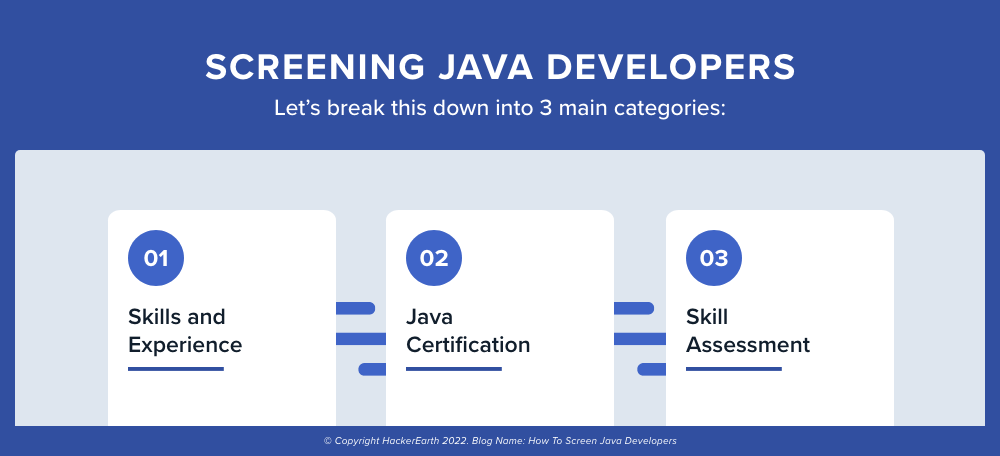How To Screen Java Developers

Due to the number of increasing use cases, Java is among the most used programming languages right now. This goes without saying, the demand for Java developers is never-ending. As per StackOverflow, the demand for Java developers is as high as ever and 64% of respondents also stated that it’s the most used.
There are quite a lot of talented JAVA developers out there but it still can be quite the hassle to find the right developer for your company. As a recruiter, you should keep an eye out for certain skills and attributes that are apt for the job role.
Furthermore, as a recruiter, there are certain things you too should know about this programming language. For starters, understanding the language may not always be enough and this is why experience in Java frameworks in the Java ecosystem is crucial too. You need to know that this language is updated frequently, this means you need someone with an updated knowledge who has worked with this language recently and not the one with outdated information which is not relevant in today’s industry anymore.
What is Java?
Java is a versatile, high-level programming language widely used for building web, mobile, and desktop applications. Known for its platform independence, Java allows developers to write code once and run it anywhere. Its robustness, security features, and extensive libraries make it a popular choice for enterprise-level applications and Android development.
Without further ado, let’s get started with how to screen Java developers:
What does Screening a Java Developer mean?

Breaking it down helps in understanding the role better, which in turn, helps you screen java developers better.
Skills you should look for in a Java developer
Understanding the skill set of a java developer helps you understand the skill and skill level required for this role.
Here’s a brief list of skills you should look for in a Java developer while screening:
- Regardless of how experienced the developer is, he should have adequate knowledge of basic data structures.
- If you want to screen a senior Java developer, they should know all about multi-threading and concurrency.
- If your job role requires it, then the developer should possess good algorithmic skills too.
- They should have a strong knowledge of databases and should be familiar with SQL and its basics.
If the job role revolves around developing web applications, the candidate should also know about:
- Markup languages like HTML, CSS, etc.
- Service Oriented Architecture
- Web frameworks like Spring boot, etc.
- Servlets and JSP
Java certification: Is this important?
Java certification is yet another thing you should look for in candidates while hiring for a role with the same requirements. It tells you that the developer has an above-average understanding and knowledge of this language.

Here’s an important point to note, every developer does not have this certification nor does every company ask for one. But as a recruiter, you should always look for someone with above-average knowledge of the programming language.
Assessing a Java developer’s skills
Hiring a developer is not a difficult task if you are prepared. Here are a few tips you can implement as a recruiter to better prepare yourself for interviewing Java developers:
- Learn about the specifics of the job role, this way you can understand what the job role requires.
- You should know how to test their skills. For recruiters who aren’t technically sound, you can make use of online interview/coding assessment platforms like HackerEarth Assessments.
- In terms of skills and experience, let your candidate know what you expect from them
- Don’t stop at assessing technical skills, evaluate other attributes like team-playing abilities, communication, and many more
These are a few tips for you to keep in mind.
Here are a few questions you can incorporate into your questionnaire for the interview process:
- What is Java and how is it different from C++?
- Explain the “IS-A” relationship in OOPs Java.
- List the overloaded add() and addAll() methods that are available in the List interface. Explain their uses.
- Why are contiguous memory locations used to store actual values in an array but not in ArrayList?
- If you need to make multiple updates, should you choose String Buffer or String?
- Explain the difference between the method of a class and a constructor in Java
- List the different Thread priorities in Java.
- Explain how a single try block and multiple catch blocks co-exist in a Java Program
- Is it possible to overload static methods?
- Explain shallow and deep copy in Java
Get advanced recruiting insights delivered every month
Related reads
Vibe Coding: Shaping the Future of Software
A New Era of Code Vibe coding is a new method of using natural language prompts and AI tools to generate code. I…
Guide to Conducting Successful System Design Interviews in 2025
Article Summary Introduction to Systems Design Common System Design interview questions The difference between a System Design interview and a coding interview Best…
How Candidates Use Technology to Cheat in Online Technical Assessments
Article Summary How online assessments have transformed hiring Current state of cheating in online technical assessments Popular techniques candidates use to cheat Steps…
Talent Acquisition Strategies For Rehiring Former Employees
Former employees who return to work with the same organisation are essential assets. In talent acquisition, such employees are also termed as ‘Boomerang…
Automation in Talent Acquisition: A Comprehensive Guide
Automation has become a major element in the modern-day hiring process. The automated hiring process gained momentum since the advent of remote work…
Predictive Analytics for Talent Management
The job landscape in today’s age is highly competitive for both job seekers and hiring managers. Finding the right talent under such conditions…










